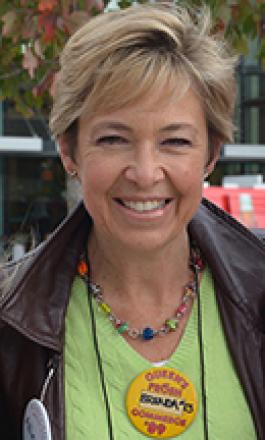A Seat at the Table

Brenda Trenowden, BCom’89, is an ardent supporter of the 30% Club, an initiative to increase the representation of women on corporate boards. There’s a compelling business case for reducing the gender gap, she says, and lessons for Canada’s Club from its U.K. counterpart.
What’s wrong with this picture, taken in the 1940s, when men ruled the country’s corporate boardrooms? Cigars and extra-wide lapels aside, the obvious answer is the absence of even one woman at the boardroom table. If you think the situation has improved since then, a recent federal government report dispels the notion. Nearly 40% of FP500 companies and close to half of publicly traded companies in Canada have no women on their boards. [“Good for Business: A Plan to Promote More Women on Canadian Boards”, June 2014.] While women represent nearly half the Canadian workforce, the report continues, only 15.9% of corporate board positions at FP500 companies are held by women.
Brenda Trenowden isn’t discouraged by these rather dismal figures. She’s working to change them. She’s on the Steering Committee of the 30% Club, an organization founded in the U.K. in 2010, when that country’s representation of women on boards was just 12.5%. The Club has grown internationally to include clubs in Hong Kong, the U.S., Ireland and, soon, in Canada. The Club’s objective is to see 30% of FTSE-100 boards in the U.K. comprised of women members by 2015. The Club is comprised of supporters, Chairs and CEOs committed to better gender balance at all levels of their organizations, and led by the Steering Committee, numbering 29 women who are senior business professionals in the U.K.
“There are many different women’s groups out there, and we’re all trying to improve gender balance,” Brenda says. “The difference with the 30% Club is that it’s a campaign.” The group’s founder, Helena Morrissey, CEO of Newton Investment Management, had a vision, Brenda explains. “She said that while we’d been talking about this for years, we hadn’t moved the needle, the numbers weren’t changing. What we needed was for the people in charge — the CEOs and Chairs of Boards — to drive this as a business-led initiative.”
Brenda was an early supporter of the U.K. Club, joining its Steering Committee in 2010. It was a perfect fit for the 25-year international-banking veteran and President of City Women Network (CWN), an association for senior executive women working in London’s financial district known as The City.
A consummate networker, Brenda is plugged into London’s vibrant business scene, having worked at some of the world’s largest banks, including Citigroup, BNP Paribas, Lloyds Banking Group and BNY Mellon. In January 2014, she joined ANZ (Australia and New Zealand Banking Group) as Head of the Financial Institutions Group for Europe and as Global Head of Funds. She is also a Trustee and Treasurer for the Asian University for Women U.K. Support Foundation, a Trustee of Queen’s Bader College and a member of QSB’s Global Council.
Since its inception, the U.K. 30% Club has seen significant improvement in the number of women on corporate boards. “We started at 12.5% in 2010 and are now at 22.8%, so the numbers are very powerful,” Brenda says. The Club’s approach has been to emphasize the business case for improved gender balance at the board level. The group has rejected imposed quotas, focusing instead on education, using research that has shown that a greater balance in gender at board and management levels helps improve financial performance. The group also cites findings that institutional investors are increasingly considering overall board effectiveness, including gender balance, as an important aspect of good governance.
Nearly 40% of FP500 companies and close to half of publicly traded companies in Canada have no women on their boards.
The Club’s message resonated with leaders of some of the U.K.’s top companies, including Rolls Royce, BT (British Telecom), Marks & Spencer, Lloyd’s of London, Sainsbury’s and Barclays, among many others. “The initial supporters of the group included some fantastic chairmen. Chairmen listen to other chairmen; they move in the same circles. So those who decided to support the Club and promote its aspirations not only influenced change in their own companies, but in others, too. Meanwhile, the U.K. government released the Davies Report [“Women on Boards”, 2011] at around the same time, with a 25% target and recommendations on creating better governance and having more diverse leadership at the board level. The 30% Club and the Davies Report each generated much discussion, both in the press and in companies in the U.K., so this really helped build momentum.”
It didn’t take long for other jurisdictions around the globe to take note. Hong Kong established the first international chapter in 2013, followed by the U.S., Ireland and Southern Africa. Clubs are due to launch in Australia and Canada in the coming months. Given her senior role at ANZ and her Canadian roots, Brenda stepped forward to help champion the Canadian and Australian Clubs, sharing best practices and offering advice and encouragement.
The Canadian model is slightly different in that Canada’s 30% Club is partnering with Catalyst Canada, an offshoot of the international non-profit organization dedicated to expanding opportunities for women in business. The Catalyst Accord has already enlisted the support of 27 large Canadian companies that are committed to increasing the number of women at the board level. The partners’ goal is to reach the 30% mark by 2020. A major event is planned for Toronto in January to promote the 30% Club/Catalyst Canada partnership.
Brenda is excited at the prospect of being involved in the launch of Canada’s 30% Club. “Canada is an important country in the global economy,” she says. “Since the onset of the financial crisis in 2008, the world watched as Canadian banks weathered the storm, thanks to their good governance. If we can get the banks to take the lead on this, they could really make a difference. In other industries, too, especially in natural resources and technology, Canada is a leading player. I think the international community expects Canadians to be further along on this front.”
There are ample opportunities for Canadian women and men to get involved, Brenda says. “We need people to get their chairmen and CEOs on board. So offer to have your company host an event, bring your chairman, and have our Canadian co-chairs come in and talk about it. Or offer to work on the social media side, or provide expertise in communication.”
She’s serious. At the conclusion of our interview, Brenda insisted that this article include her email address (brendatrenowden@sky.com). “Tell them to email me and I’ll put them in touch with the right people.”

